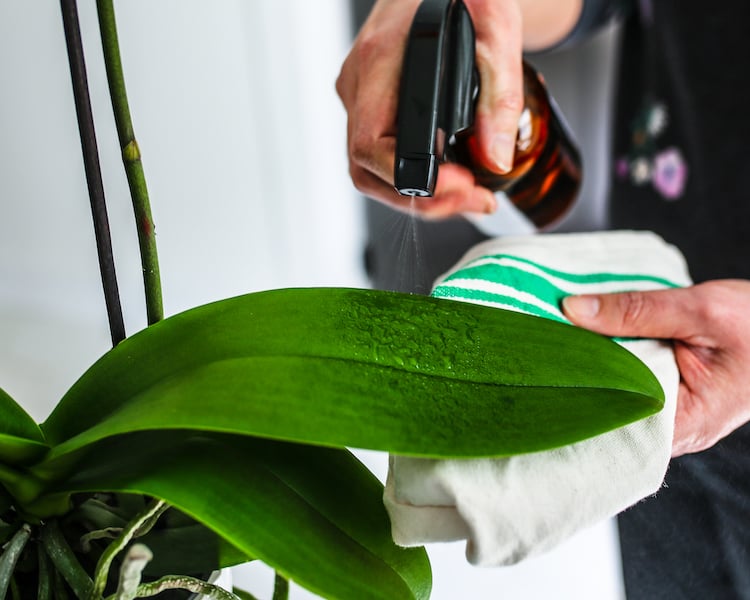
When it comes to caring for your plants, there can be a lot of ways to help keep them healthy, apart from light and water. No matter where you live, your plant can be susceptible to bugs, fungi, and disease.
We know hearing that can be scary as a plant parent! However, we want to help you learn about some natural remedies that can help heal your plant.
One key to your orchid’s health and to manage pest control, along with insecticidal soap, is the use of horticultural oil. These (generally non-petroleum) oils work much like insecticidal soap does: the fatty, waxy buildup blocks the ability of insects to breathe. The benefit to using them is that they are natural, easy to use, and cause little problems with the plant itself—particularly since horticultural oils are not poisonous to plants—or those nearby, as well as being safe for children and pets. Even friendly insects are safe in many cases!
For your Phalaenopsis orchid, you will want to find a fine (or light) horticultural oil to help you get rid of orchid enemies like spider mites, scale, thrips, mealy bugs or aphids. Too heavy an oil, or impure oils mixed with sulfur or a strong insecticide may cause damage. You also won’t want to use oils for plants that are stressed by drought or high heat. One of our top recommendations is neem oil.
Not only is it a natural pesticide and plant fungicide, but it works on powdery mildew, rust, black spots, and anthracnose. It really works by preventing fungal spores from germinating and penetrating the leaf tissue. But it won't kill the fungus itself, so you must keep an eye on your plant still!
Neem oil is often used by botanists, as it comes from the Margosa tree found mostly in India, where it has been used as an insect repellent and for pest control for centuries. Non-toxic to humans, animals and beneficial insects, it is a good choice for indoor plants. Mix with water and a small amount of dish soap and spray from a bottle, reapplying with a fresh batch every few days. Your mixture will break down after about eight hours, so you don’t want to mix too large a batch at once.
If the idea of using Neem oil concerns you, another natural oil is Orange Oil. It smells nice and fresh, and if you can’t find it on its own to mix into your own winning combination. It is sold commercially as Orange Guard.
Neem oil is often worldwide for dozens of different uses, especially to kill of unwanted pests and other diseases.
While Neem oil isn’t a full problem solver for insects, applying it frequently will help. It does this by stopping their larvae from developing growing and even from the insects themselves even laying eggs.
The oil works by coating the plants surface to prevent this, with the added bonus of making your leaves look beautiful and shiny.
A great mixture is about 1 teaspoon of neem oil and about ½ teaspoon of plant-safe dish soap, like Dawn and about 1 quart of warm water. Like we said above, the solution will break down quickly, so plan to toss what’s leftover or make smaller batches.
Shake the solution often when applying so it doesn’t separate and make sure to cover all the plant’s surfaces when applying to have the most efficacy. The effectiveness of the neem oil can wear off over time, so reapply semi-frequently, especially when it is warmer.
For orchids, only coat the stems and leaves, don’t spray the blooms with the solution.
In most cases, if there are any insects, you should see them drop right away after the solution is applied. If not, continue to reapply bi-weekly until your plant is itself again!

Copyright Just Add Ice® Orchids 2023